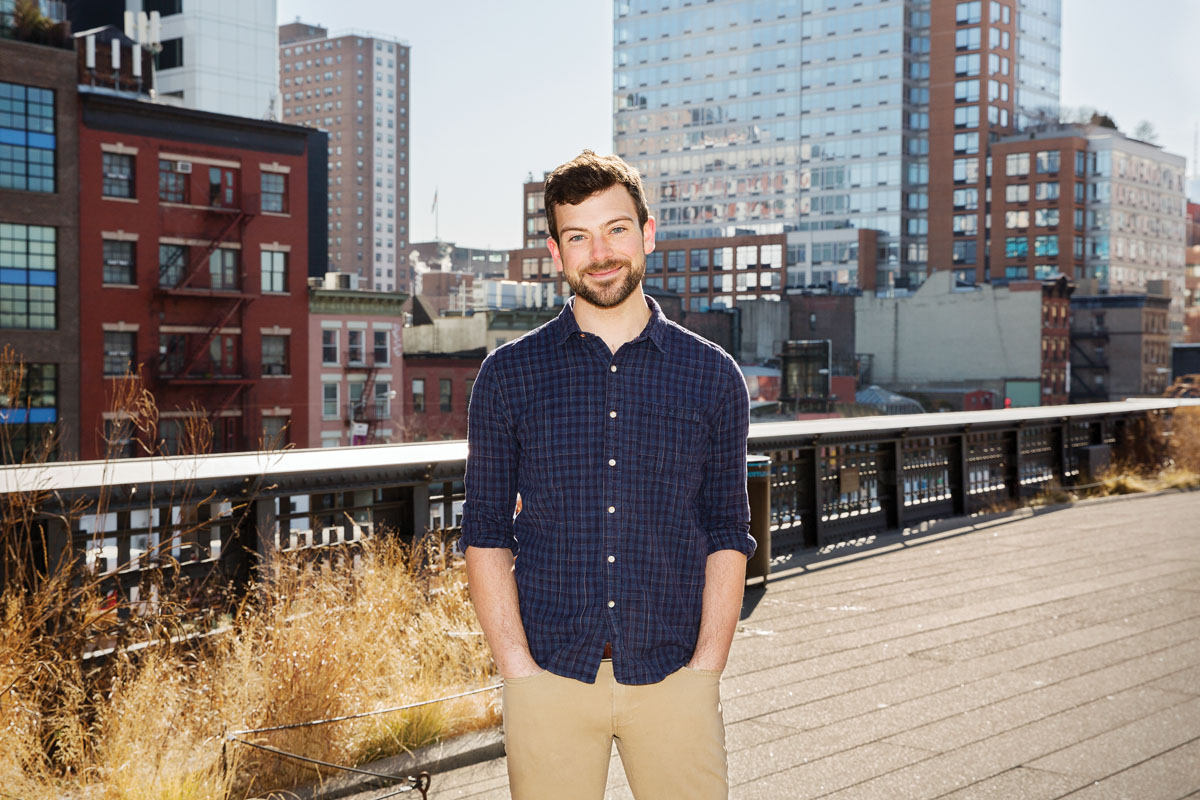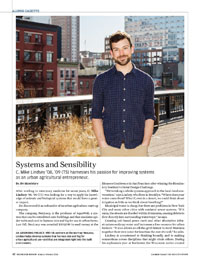Alumni Gazette
 AN ABSORBING PROJECT: With his partners at the start-up NexLoop, Lindsey helps develop systems that harness rain and fog for urban agricultural use—and that are integrated right into the built environment. (Photo: Shannon Taggart for Rochester Review)
AN ABSORBING PROJECT: With his partners at the start-up NexLoop, Lindsey helps develop systems that harness rain and fog for urban agricultural use—and that are integrated right into the built environment. (Photo: Shannon Taggart for Rochester Review)After working in veterinary medicine for seven years, C. Mike Lindsey ’08, ’09 (T5) was looking for a way to apply his knowledge of animals and biological systems that would have a greater impact.
He discovered it as cofounder of an urban agriculture start-up company.
The company, NexLoop, is the producer of AquaWeb, a system that can be retrofitted onto buildings and that emulates spider webs and cacti to harness rain and fog for use in urban farms. Last fall, NexLoop was awarded $100,000 in seed money at the Bioneers Conference in San Francisco after winning the Biomimicry Institute’s Global Design Challenge.
“We’re taking a whole systems approach to the local-food conversation,” says Lindsey, who lives in Brooklyn. “Where does your water come from? What if, even in a desert, we could think about irrigation as little as we think about breathing?”
Municipal water is cheap, but there are problems in New York City and many other cities with outdated sewer systems. “If it rains, the streets are flooded within 10 minutes, causing debris to flow directly into surrounding waterways,” he says.
Creating soil-based green roofs and other absorptive infrastructure soaks up water and harnesses a free resource for urban farmers. “It also allows an off-the-grid farmer in rural Montana to gather their own water for less than the cost of a well,” he adds.
Lindsey is accustomed to thinking broadly, and to making connections across disciplines that might elude others. During his sophomore year at Rochester, the Wisconsin native created an interdisciplinary major called “integrative neurobiology,” studying the biological and neurological factors contributing to animal behavior and cognition.
“I started taking classes in brain and cognitive sciences and psychology and got pulled into the neuroscience world,” he says. He spent a fifth year completing a Take Five program called “Understanding Bilingual Representation,” in which he analyzed how language is organized in the brain.
His Take Five advisor was Jeffrey Runner, a professor of linguistics and now dean of the College.
“I remember C. Mike as someone who was very creative and very outgoing,” Runner says. “He got the most out of his Rochester experience.”
Lindsey had long wanted to be a veterinarian, and sought experience in the field after graduation. In roles at veterinary hospitals and zoos, “I helped with everything from diabetic cats, to dogs hit by cars, to an anteater’s endoscopy, and even autopsies on endangered species like a clouded leopard and a maned wolf,” he says. The work fascinated him, but “it’s a stressful field and really tough emotionally.”
Not one to limit his pursuits, Lindsey was at the same time following Brooklyn Grange—the largest soil-based rooftop farm in the world—on Instagram. In 2015, he added an apprenticeship there to his routine, as a change of pace.
“It was idyllic, and a stark contrast to stressful days in the emergency room,” he says. “At 5 a.m., I’d watch the sun rise over the New York skyline while picking tomatoes and salad greens in the middle of the city.”
A friend from Rochester connected Lindsey with Jacob Russo, a recent Carnegie Mellon graduate who is completing a master’s program in biomimetic architecture in Germany. They teamed with Anamarija Frankic, an ecology research professor in Croatia who specializes in coastal water ecosystems. NexLoop was formed.
Lindsey’s life course—from Rochester to veterinary work to his role at NexLoop, focused on business and customer development—may seem like it’s taken twists and turns. And yet, some basic elements have been pretty constant. “The common thread in all of this,” he says, “is that I really enjoy using different perspectives to improve systems.”

